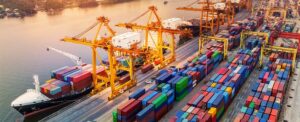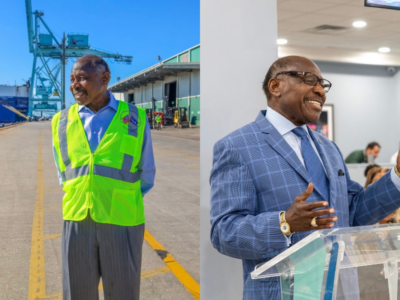Dear Friends and Supporters,
I am writing to you today as Dennis A. Daggett, a member and Executive Vice President of the International Longshoremen’s Association (ILA), and a representative of the International Dockworkers Council (IDC). At this critical juncture, we need your understanding and support more than ever.
Over the past few years, the shipping industry has undergone a significant transformation. Many private equity firms like BlackRock, Vanguard, and State Street, which now own 88% of the companies on the S&P 500, have started to infiltrate our industry. Firms like BlackRock, focused solely on profits and return on investment, have partnered with companies like Mediterranean Shipping Company’s subsidiary, Terminal Investment Logistics (TIL) and others, to acquire and build terminals worldwide. Their influence is growing, and it poses a direct threat to our livelihoods.
A decade ago, ocean carriers decided to exit the terminal operating business to concentrate on their steamship lines and logistics. But now, in the aftermath of the pandemic, they are reclaiming control over terminals. This shift isn’t just about business strategy—it’s about controlling where and when they can place their cargo without dealing with third parties. For them, it’s about power and profits. For us, it’s about our jobs and the future of our families.
BlackRock and other private equity firms don’t care about workers. They care about their bottom lines. They see automation as a way to increase profits, even if it means eliminating jobs historically performed by human beings. For the past two years, the ILA has been fighting to secure a new contract for our members, with our current contract expiring on October 1, 2024. We know what we’re up against, and we’re ready to fight to protect and preserve our jobs and our industry.
We’ve been paying close attention to the enormous profits ocean carriers and terminal operators have made in recent years, despite global challenges like conflicts in the Middle East, terror in the Suez Canal, and the drought in the Panama Canal. These companies have raised rates on their customers to keep their profits soaring, but they refuse to share this wealth with the workers who helped them achieve these profits. Instead, they aim to cut costs further by eliminating jobs and attempting to automate our work.
As we approach the deadline for our contract, you will see media outlets portray us as greedy and ungrateful. They will claim that longshoremen make too much money, but they won’t tell you the whole story. Our jobs don’t follow a 9-to-5 schedule. We work when the ships call, often putting in up to 100 hours or more a week to provide for our families. We don’t complain about the work—we are proud of what we do. But we need the public to understand the truth.
The Life of an ILA Worker
Being a longshoreman is not just a job; it’s a way of life. Our work doesn’t conform to a standard schedule. We are at the beck and call of the ships, meaning our hours are dictated by their arrival and departure times. For example, If a ship arrives at 1 AM, we are there to unload and load it. This unpredictability means long and irregular hours, but it is the reality we embrace to ensure goods move efficiently through our ports. This also makes it incredibly difficult for longshoremen to find the work-life balance that so many people talk about today. Our members sacrifice a lot for their families and often miss dance recitals, little league games, and other important family moments. I am not complaining here just stating the facts on our reality.
Seniority plays a crucial role in our industry. Only those with seniority can expect consistent work. Newer members often face long periods without work, having to be on call and ready at a moment’s notice without any guarantee of work opportunities. In ports like New York/New Jersey, if a longshoreman is not available for at least fifteen out of thirty days over two consecutive months, they risk being “decasualized.” This means suspension from work for at least a year, pending a review by an external judge or panel outside our industry.
Years ago, the saying on the waterfront was that the men were made of steel and the ships were made of wood. In the era of bulk and break-bulk cargo, longshoremen had to be strong, with big forearms and backs to handle the physically demanding work. Since the evolution of containerization, our jobs have become highly skilled. We now operate advanced, multi-million-dollar container handling equipment, making our roles more complex and technically demanding.
Our job involves operating multi-million-dollar equipment, managing sophisticated logistics, and ensuring the safe and efficient movement of cargo. We handle everything from ship-to-shore cranes, rubber tire gantry cranes, straddle carriers, top loaders, reach stackers, and rail-mounted gantry cranes, hustlers, autos, and heavy lifts, to refrigeration containers with perishable items and pharmaceuticals. Our clerks use advanced terminal operating systems to manage vessel and yard operations, ensuring that the loading and discharge of ships are conducted smoothly and efficiently, while our maintenance workers repair and maintain all the equipment to ensure everything runs smoothly.
Our operators are highly skilled professionals who handle multi-million-dollar equipment to move cargo safely and efficiently. They are an integral part of our port operations, ensuring that every container is moved precisely where it needs to be.
Our clerks play an equally vital role. They manage advanced terminal operating systems, coordinating the intricate logistics of loading and unloading ships, and overseeing yard and gate operations to ensure cargo moves in and out of terminals efficiently and safely.
Our maintenance workers are also extremely important to our industry. They don’t just repair and maintain chassis’s and shipping containers; they handle the upkeep of all the sophisticated cargo handling equipment. This includes ship-to-shore cranes, rubber tire gantry cranes, straddle carriers, top loaders, reach stackers, rail-mounted gantry cranes, hustlers, and refrigeration containers that carry perishable items and pharmaceuticals. Our maintenance workers ensure that every piece of equipment operates safely and efficiently, minimizing downtime and maximizing productivity.
Our lashers play an equally important role. They secure the containers on the ships to ensure they stay in place during transit. This is crucial for the safety of the cargo and the efficiency of the shipping process. Without their expertise, containers could fall off ships during rough seas, leading to significant losses and disruptions.
Additionally, our warehouse workers are integral to the supply chain. They are responsible for stuffing and stripping containers, which ensures that products reach their consignees faster and more efficiently. This critical task helps maintain the flow of goods and supports the overall efficiency of our operations.
Despite the critical nature of our work, our job security is constantly under threat from corporate interests that prioritize profits over people. Employers have the power to lay us off or cut our hours when volumes are low or when they seek to cut costs. Yet, we can only address major issues outside of grievances during bargaining periods. This imbalance leaves us vulnerable and underscores the importance of our fight for a fair contract.
Our contracts over the past 20 years have been six-year deals. We understand the importance of a stable, long-term agreement for not only both sides but for our country. However, while employers can lay us off or cut our hours, we cannot renegotiate outside the terms of the collective bargaining agreement, even when they are making record profits. We live up to our commitments, but we cannot renegotiate wages and benefits until the next round of bargaining, and that time is now!
We are not asking for sympathy. We are asking for understanding and support. We are proud of our union and our industry. This work is not for everyone—it’s for those who are strong, dedicated, and willing to work under challenging conditions. We are fighting not just for ourselves, but for the rights and welfare of all workers. We will not let corporate greed destroy what we have built and more importantly what our ancestors fought and died to protect.
As we get closer to our contract deadline, you may hear more about the possibility of a strike. We want you to know that we are doing everything in our power to reach a fair agreement without disrupting the flow of goods you rely on. But in all honesty, we are prepared to stand up for what is right, even if it means taking drastic measures.
Thank you for taking the time to understand our struggle. Your support means everything to us as we continue to fight for fair treatment and the preservation of our industry, our jobs and our benefits.
I remain,







Leave a Reply